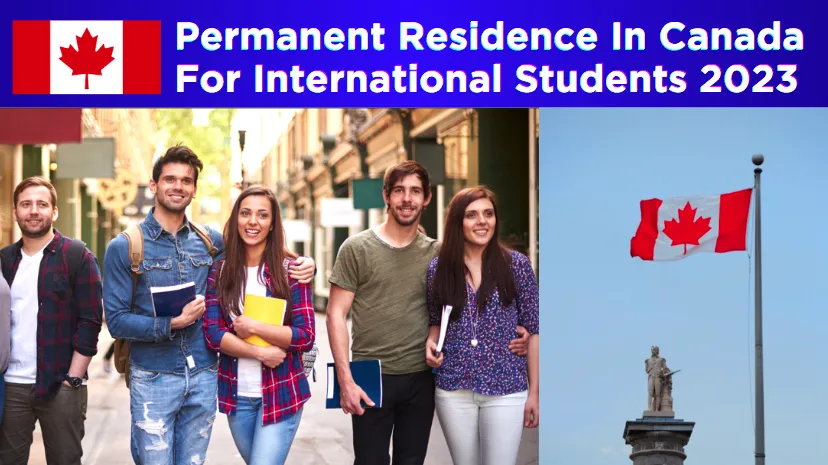According to Information on Immigration, Refugees, and Citizenship Canada (IRCC). In 2019, there were approximately 642,000 international students in Canada, indicating the country’s position among the world’s most important study destinations.
Compared to countries like the United States, England, or Australia, Canada’s multicultural environment, access to world-class education, and the possibility of applying for a temporary work permit after graduation make it a great place to live. It’s useful. Fun to learn.
Due to Canadian immigration laws, many students consider this the first step to staying. Permanent residents (PR)—and finally,citizens of Canada! In this article, we present several options for international students in Canada to get into public relations.
| Are you considering studying in Canada? you see Study Permit: Immigrate to Canada as an International Student A step-by-step guide on how to apply for a study permit in Canada |

There are several immigration programs that international students can apply to:
- Ent ExpressR.East is a federal program that sends your profile and ranks you among other candidates in the group. International students who completed high school in Canada can earn up to 30 points. Comprehensive Rating System (CRS) Express draws take place every few weeks, and the best performers are invited to apply for a PR. You then have 60 days to file a complete claim. Typically, the processing time for completed programs is six months. In the Express Entry program, depending on your situation, you may be eligible for:
- Chamber of Canadian Experience (CEC)
- Federal Skilled Worker (FSW) Program
- Provincial Nominee Program (PNP)
- Federal Skilled Trades Program (FSTP)
- Atlantic Immigration Program (AIP): a program managed by an immigrant employer
Comments:
- Some of these groups are looking for Canadian candidates. If you want to work in Canada after graduation, you must apply for a work permit through the Public Diploma Program (PGWP). Graduates of designated educational institutions (DDIs) are eligible for PGWP. Make sure to review everything before registration. If you are not eligible for PTPD, you can still work in Canada after graduation. Learn more about other work permits and see if you qualify.
- Completing an Express Entry profile is the first step towards permanent immigration to Canada as a skilled worker. Completing an Express Entry profile does not guarantee that you will receive a PR request. The Public Relations Job Application Call will enter your score into the Express Entry pool using CRS.
| Advice:Learn how to create a quick connection profile for better understanding. Fast Entry: Immigrate to Canada as a Permanent Resident (PR). |
Read Also: The Ultimate Guide to Mastering in Canada 2023
Join TelegramUnderstanding of language basics and skills
Before learning more about other immigration programs, here are two important terms you need to know:
- Canadian Language Benchmarks (CLB)
Canadian standards are used to describe, measure, and assess the English language proficiency of adult immigrants and potential immigrants who plan to live and work in Canada or apply for citizenship. The Canadian Language Benchmarks (CLB) are used to measure knowledge of the French language.
| Requirements: Language tests are valid for two years from the date test results are available, and they must be valid on the date of your PR application. |
- National Occupational Classification (NOC)
night They classify all jobs in the Canadian labor market into job categories and the skills, education, and knowledge required to perform those jobs. The NOC group has TEER units that represent it. Train, EAST education, EAST experienceibility for each job
For immigration purposes, TEER occupations 0, 1, 2, and 3 (formerly Skill Type 0 and Skill Levels A and B) require high-skill programs such as Express Entry. On the other hand, TEER 4 and 5 (destruction levels C and D) are professions that do not require formal education but do require on-the-job training.

Fast Entry: Department of Canadian Experience (CEC)
SinceCIK, your program It is aimed at professional workers who have work experience in Canada and who wish to become Canadian citizens.
Eligibility to apply through CEC as an international student:
- There are no educational requirements to apply for the CEC program, but you can earn additional credits for your Canadian studies.
- Check your language skills in English or French for the official exam.
- The NCLC 7 is required if your NOC is TEER 0 or 1 (formerly NOC skill type 0 or skill level A).
- CLB 5 is required if your NOC is TEER 2 or 3 (previous skill level B).
- Accumulate at least 12 months (full-time, part-time, or a combination of both) of work experience in Canada in a TEER 0, 1, 2, or 3 (pre-NOC 0, A, or B) occupation. Experience gained while you were a full-time student (even if you spent time working together) does not count toward this program’s requirements.
- Create a profile for a quick connection.
Fast Entry: Federal Skilled Worker (FSW) Program
The FSW program is intended for foreign workers who wish to become Canadian citizens.
Requirements to apply to the FSW program as an international student:
- There are no educational requirements to apply for the FSW program, but you can earn additional credits for your Canadian studies.
- Check your language skills in English or French for the official exam.
- NCLC 7 is mandatory for all NOCs.
- Have at least 12 months of continuous experience (full-time, part-time, or a combination of both) in a TEER 0, 1, 2, or 3 position (formerly NOC 0, A, or B). What you earn studying in Canada may count toward your employment requirements.
- They are paid in the form of a salary or commission.
- Continuation (no vacant position); and
- He communicates with others. Program Requirements.
- You must show that you have enough money for you and your family to live in Canada, unless you are:
- Now he can. It works legally in Canada.
- It is. Enough work, Canadian employers
- Create a profile for a quick connection.
“If you graduate from a Canadian school, try to get into a co-op program as soon as possible and get a job after you graduate. Working with an internship helped me apply for PTPD, so I didn’t have to worry. It also gave me more time to apply to PR.”
Lucas Mendonca, Canadian PR A former international student on the road
Brzi Unos: Provincial Nominee Program (PNP)
The PNP program is intended for professional workers who wish to immigrate to a specific region and become Canadian citizens.
Requirements to apply through PNP as an international student:
- Complete your studies in Canada.
- Check your language skills in English or French for the official exam.
- Eligibility standards vary by state.
- Collect work experience. Requirements and eligibility vary by state.
- Employment may be required (requirements vary by region).
- Create an Express Entry profile or apply directly to the district.
A Brief Description of PNP for International Students:
- Ontario:They offer three courses aimed at different levels of postgraduate training:
- International flow of students (work needed)
- Doctoral students
- Master section
- Quebec:If the student has advanced French, he or she does not need an internship. See for more information. Quebec PEQ Program (Québec Studies Stream Graduate)
- New Brunswick, East Prince Edward Island:Even under the AIP program, you don’t have real flows.
- Alberta,British Columbia,Saskatchewan,Manitoba,New Scotland, East Newfoundland, and Labrador They also have special international feeds.
- Note the Northwest Territories,Yukon, and East Nunavut.There are no courses dedicated to international students.
| Advice:See for more information on the PNP program. Provincial Nominee Programs (PNP): Immigrate to Canada as a Permanent Resident (PR). |
Brzi unos: Federal Skilled Trades Program (FSTP)
The FSTP is aimed at experienced business professionals who wish to become permanent residents of Canada.
Eligibility to apply through FSTP as an international student:
- There are no educational requirements to apply through the FSTP, but you can earn additional credits for your Canadian studies.
- Check your language skills in English or French for the official exam.
- NCLC 5 for speaking and listening
- NCLC 4, reading and writing
- Accumulation of at least two years of professional experience (within the last five years) in a qualified profession in the main categories TEER 2 or 3 (formerly CNP B) (main categories 72, 73, 82, 92, 632, and 633).
- and secure full-time employment. A minimum of one year or a certificate of qualification in a skilled trade issued by a provincial or territorial government in Canada is required.
- You must show that you have enough money for you and your family to live in Canada, unless you are:
- Now he can. It works legally in Canada.
- It is. Enough work, Canadian employers
- You will be rated according to your region or sector of activity. Canadian employers may want to offer you experience and training. To learn more about the assessment, you should visit the website of the agency that regulates businesses in the state or region where you want to live and work. The route is different depending on where you want to go. If your product is not regulated by a state or territory, it may be regulated by a state (for example, an airline). You can find out who manages your listing by visiting their website. Canadian Information Center for International Credentials
- Create a profile for a quick connection.
Atlantic Immigration Program (AIP): International Students
The AIP program is a pathway to permanent residency for international professionals and graduates who wish to work and live in one of Canada’s four Atlantic provinces: Newfoundland and Labrador, Island Prince Edward, Nova Scotia, and New Brunswick.
As an international student, you can apply through AIP.
- Complete your studies at a public institution in Atlantic Canada. You must graduate from the institution within 24 months prior to submitting your PR application.
- You must be a full-time student throughout your studies.
- You must live in the Atlantic region for at least 16 months in the two years prior to obtaining your degree, diploma, or certificate.
- If you wish to include university degrees obtained outside of Canada, you should do so. Studies have been tested.
- Check your language skills in English or French for the official exam.
- CLB 4 is required.
- AND Full-time by employer Required for TEER 0, 1, 2, 3, or 4 (formerly NOC 0, A, B, or C) in Atlantic Canada. This PR must be valid for one year from the date of issue and must not be permanent.
- Show that you have enough money to provide for yourself and your family upon your arrival in Canada.
- You have the necessary visa or permit to work, study, or teach in Canada.
Lucas Mendonca, an international student in Canada in public relations
International students don’t have many PR application options, but they do get some points on their application to study and work in Canada, which increases their chances of getting a PR application before other groups of students. candidates.
When deciding which option is best for you, it is important to consider the county you want to move to and any restrictions that may affect you (for example, if you graduated from another county). If you are unsure or have any problems, consult a licensed immigration consultant or a lawyer.
